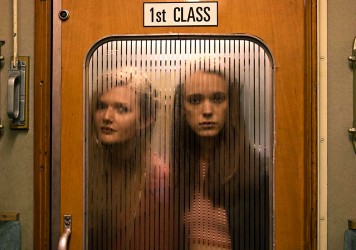Lars von Trier’s latest is an exercise in claustrophobic filmmaking, rife with symbolism and an unstoppable momentum.
“If there is any town the world would be a little better without, this is it,” said Grace of her stay in the 1930s township of Dogville. With Manderlay, she has had the strange misfortune of stumbling across another such place – a Deep South plantation where slavery is still in practice 70 years after its official abolition.
How can such barbaric inhumanity be allowed to reign free in a country which holds personal freedom above all else? Grace unwittingly makes it her moral obligation to regulate this abuse of power and give the democracy-starved slaves the freedom they deserve. What could possibly go wrong?
Filmed in the bold but bare theatrical aesthetic coined by Berthold Brecht, Manderlay is (after Dogville) the second part of a proposed ‘America’ trilogy from Lars von Trier. Assuming the role of Grace from Nicole Kidman is (relative) newcomer Bryce Dallas-Howard. She doesn’t bring the same vulnerability and electric presence to the character as Kidman, but she does demonstrate a vitality and idealism which accompanies the specifics of this particular role rather well.
It will come as no surprise that Manderlay is a film that actively seeks to rile its viewer. Very little room is left for ambiguity in a narrative so calculated that every line, prop and nuance is bound by a premeditated cause and effect concocted by von Trier himself.
This is claustrophobic filmmaking, rife with symbolism and an unstoppable momentum. It gives purpose to the spartan set design, purifying the film’s message and forcing a reaction from the audience. Emotional rape or measured storytelling? The jury is still out.
Of the many idiosyncrasies that Manderlay chooses to run with, perhaps the most dubious is the suggestion that the relationship between master and slave was not, in fact, one of acrimony and derision but benign acquiescence – hell, even love. But there is an explanation: Manderlay is not a film about slavery.
It addresses the component of ‘slavery’ inherent in all forms of government; the totalitarianism imbued within so-called enlightened democracies, and the false notion that there exists an ideology which surmounts racial or class barriers. Grace’s smug moral supremacy over the supposed subservience of the slaves also helps the film work as a metaphor for the current hostilities in the Middle East, going further to suggest what might become of the area when the US finally decides to pull out.
And that’s the reason why you should see this film. While some of the dialogue may feel over-theatrical and the final twist verges on the ludicrous, Manderlay will, nevertheless, leave you lying awake at night, pondering the intricacies of the ethics and morals put to trial. It’s a curt, dispassionate and manipulative film, but it’s also bold in its assumptions, emotionally stirring and often highly amusing.
With Manderlay, von Trier has created another ode to the classic Hollywood filmmaking he so obviously reveres, and while his dexterity at fashioning mordant and highly provocative films may have reached its apogee a few years ago, it’s still a testament to the fact that von Trier at half cock is better than 99 per cent of most directors firing on all cylinders.
Published 2 Mar 2006
An emotional mauling, anyone?
The strengths easily out-weigh the weaknesses.
It’s a hard nut to crack, but the questions Manderlay raises are endlessly stimulating.

Silly self-reflexivity dominates in Colin Trevorrow’s noble attempt to sell CG dinos to a jaded modern audience.

Lars von Trier’s two-part psychosexual epic makes for invigorating, profound and occasionally baffling viewing.